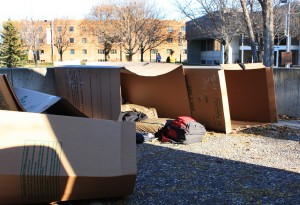First-Term Seminar creates homelessness awareness through demonstration on campus

For three nights every year, a group of first-year students spend three days and nights homeless. The students are part of Associate Professor of Political Science Richard Leitch’s First-Term Seminar (FTS) on homelessness. The students spend the three days living as if they were homeless.
The students sleep outside in cardboard boxes or on the floor in Christ Chapel. During the day, the students sit outside the Market Place waiting for other students to give them food, asthey are not allowed to buy the food themselves.
“We go to the [Market Place] around meal times, and we’re not allowed to go in the [Market Place] and ask for food, so we just have to sit outside and wait for people to bring us food,” First-year Jessica Flannery said.
Many of the participants say the toughest part of the Sleep Out is sleeping.
“[Sleeping outside] has been really difficult,” First-year Allyson Voss said. “I expected it to be kind of like camping … but the first night I slept about two-and-half hours. I didn’t fall asleep until four o’clock in the morning.”Though many of the students try to sleep outside, the cold drives them inside.
“The first night I tried to sleep outside, until my box collapsed on me. Then I got really cold, so I came inside [Christ Chapel],” Flannery said.
However, sleeping in Christ Chapel can present its own challenges. “Even in [Christ Chapel], it’s tough to get a good night’s sleep, [with sleeping] on the floor and all the distractions,” First-year Amber Barry said.
Students say that they also gain an understanding of how difficult it can be to be homeless. “You’re just exhausted. You go to class and you can’t concentrate very well,“ Flannery said. “You have no motivation to do anything. When you don’t have to go to class, you just want to sit there and do nothing because you are so exhausted.”
However, the students admit that they have only a taste of what the nation’s homeless go through every year.
“It’s been a lot harder than you would think, and we’ve only had a glimpse of it. We know when it’s over; if you’re really homeless, you don’t know,” First-year Kari Peirson said.
The students are participating in the National Hunger and Homelessness Awareness Week, which is always the week before Thanksgiving. The Sleep-Out is the signature event of the week, and it is meant to educate students on what it means to be homeless.
“The people who are doing it are certainly learning a lot,” Leitch said. “The whole point of it is to educate people about why homelessness exists.”
This is the ninth year that Leitch has taught the FTS on homelessness and the twelfth year he has participated in the Sleep Out.
“Gustavus had a Sleep Out tradition before I got here,” Leitch said. “There was a student group [that] decided they were going to do a real ‘Sleep Out’ in recognition of Hunger and Homelessness Week [in 1998], and I participated in that. The Chapel was closed at midnight, like it usually is, and from midnight until six in the morning, we were all under lights in front of that locked chapel. For me, that was really powerful.”
After that experience, Leitch was inspired to create an FTS class on homelessness. He made the Sleep Out part of that class. The students who participated in the Sleep Out learned a lot from the experience.
I think [the Sleep Out] is so critical to the class,” Flannery said. “You can talk about what you think could change things or what you could do to change these people’s lives, but … it makes you see things from a different light.”
According to the National Coalition for the Homeless, between 1.6 million and 3.5 million people experience homelessness in a year. On a given night, about 38 percent of the homeless are children. Due to the recent foreclosure crisis, homelessness has been on the rise across the country.
The twelfth annual Hunger and Homelessness Week is sponsored by Actions Supporting All People (ASAP). ASAP also hosted a Hunger Banquet on Thursday, and the Gustavus chapter of Amnesty International is holding a food drive. Donations may be left in marked boxes outside the Market Place and the Community Service Center.
I think this is a great idea. Kid’s today need to know how the other side survives, this should be a humbling experience.
Hiking Tents